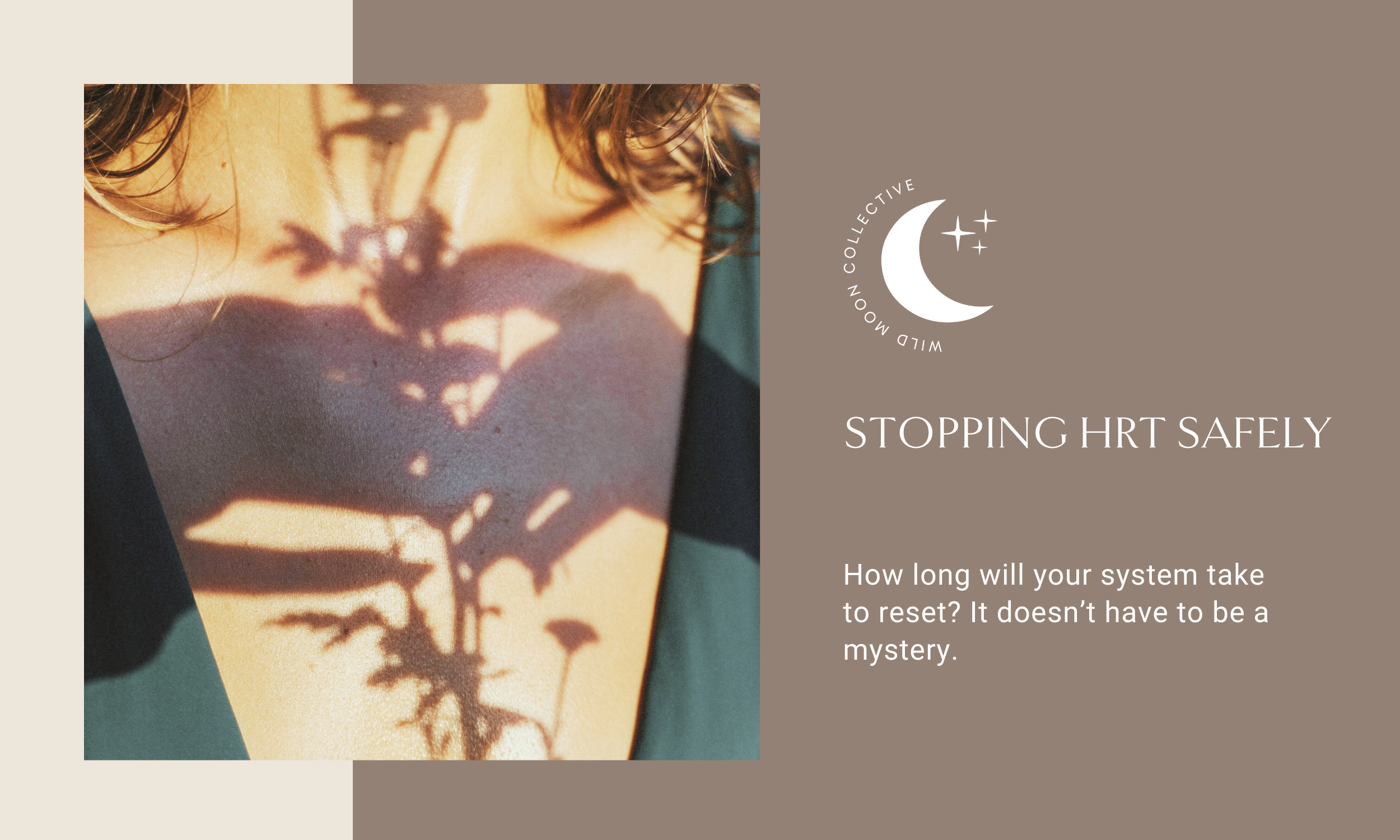How Long Does HRT Stay in Your System After Stopping? 3 Factors to Consider
So, you’ve been rocking your hormone replacement therapy (HRT) journey, but now you’re wondering: how long does HRT stay in your system after stopping? At Wild Moon Collective in Libertyville, IL, we know HRT can be a game-changer for managing menopause symptoms, hormone imbalances, or even optimizing your health goals. But what happens when it’s time to hit pause?
Let’s break down what happens when you stop HRT, how long it lingers in your system, and the key factors that influence the timeline. Spoiler alert: it’s not a one-size-fits-all answer.
What Is Hormone Replacement Therapy?
Hormone replacement therapy is like giving your body a helping hand when your natural hormone levels start to dip. It’s most commonly used to alleviate menopause symptoms such as hot flashes, night sweats, mood swings, and sleep disturbances. But HRT isn’t just for menopause; it’s also used to treat hormone imbalances or deficiencies in both women and men.
HRT typically involves estrogen, progesterone, or testosterone, depending on your needs. These hormones can come in various forms—pills, patches, gels, creams, or injections—all designed to balance out what your body might not be producing enough of.
How Long Does HRT Stay In Your System After Stopping?
Here’s the thing: the timeline for how long HRT stays in your system varies widely. Sometimes HRT can be out of your system in days, while other times it may linger for weeks or even months. Let’s dive into the three biggest factors that determine how quickly your body says goodbye to those hormones.
1. Type of HRT Used
The form of HRT you were using has a huge impact on how long it sticks around after you stop. For instance, oral estrogen or progesterone pills tend to clear out of your system relatively quickly—think a few days to a week.
On the other hand, long-acting HRT options like implants or injectable testosterone can take much longer. These forms release hormones gradually over time, meaning traces of the hormones could remain in your body for several weeks or months post-treatment.
Even the method of absorption matters. Hormones delivered via patches or gels are often processed faster than injectables, but slower than pills. Your provider at Wild Moon Collective can help you understand the specifics of the HRT you’re on.
2. Duration And Dosage Of HRT Treatment
How long you’ve been on HRT and the dosage you’ve been taking can also influence how long it stays in your system. Higher doses of HRT and longer treatment durations can result in a longer clearance period because your body may need extra time to adjust.
For example, if you’ve been on a low-dose estrogen patch for a few months, it may clear out in days. But if you’ve been receiving high-dose testosterone injections for years, you might notice lingering effects for weeks or even months.
3. Individual Metabolism
Your metabolism is the wild card here. Everyone’s body processes hormones differently, depending on factors like age, liver function, kidney health, and even genetic predispositions.
If you’ve got a speedy metabolism, your body will likely eliminate the hormones faster. But if your metabolism runs at a more leisurely pace, expect those hormones to stick around a bit longer.
Is It Safe To Stop HRT Treatment?
Before you even think about quitting HRT cold turkey, let’s talk risks. Suddenly stopping HRT can cause a resurgence of symptoms—think hot flashes, night sweats, and mood swings—because your body hasn’t had time to adapt to the change.
There’s also a chance of experiencing withdrawal-like symptoms, especially if you’ve been on higher doses. For some people, abruptly stopping HRT could lead to bone density loss or cardiovascular concerns, depending on their health history.
The bottom line? Always consult with your healthcare provider before making any changes to your HRT regimen.
Related Post: 3 Factors That Could Cause Weight Gain on Bioidentical Hormones
How to Safely Stop HRT
The safest way to stop HRT is through a gradual tapering process. This allows your body to slowly adjust to the reduced hormone levels without triggering unpleasant side effects.
Your provider at Wild Moon Collective will work with you to create a personalized tapering plan that suits your unique needs. This might involve reducing your dosage or switching to a lower-dose form of HRT before eventually discontinuing treatment altogether.
When You Should Consider Stopping HRT
There’s no universal rule for when to stop HRT—it’s a deeply personal decision that depends on your health, symptoms, and lifestyle. Some people choose to stop after a few years when their symptoms have stabilized, while others continue for longer to maintain symptom relief or other health benefits.
It’s also worth considering stopping HRT if you’re experiencing side effects that outweigh the benefits, or if your healthcare provider recommends discontinuation due to health risks.
Can You Start HRT Again After Stopping?
Yes, you can usually restart HRT if you and your healthcare provider decide it’s the right move. However, it’s important to note that restarting after a long gap might require a new treatment plan, including different doses or forms of hormones.
If you’re considering going back on HRT, chat with one of our providers about your current symptoms, health goals, and medical history. We’ll help you create a plan that aligns with your needs.
Hormone Replacement Therapy in Libertyville, IL
Hormone replacement therapy can be a transformative experience, but understanding how long HRT stays in your system after stopping is crucial for planning your next steps. From the type of hormones you’ve been using to your unique metabolism, several factors influence how long it takes for your body to adjust post-HRT.
If you’re ready to explore your options or have questions about starting, stopping, or modifying your HRT treatment, Wild Moon Collective is here to guide you every step of the way.
Contact us today or schedule an appointment and take the next step in your hormone health journey!



